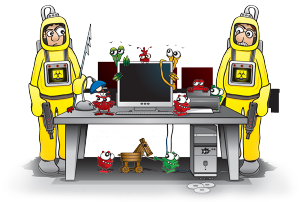What You Need To Know About Securing Your Business Network
It’s Monday morning and one of your employees notifies you that they lost their laptop at a Tim Horton's over the weekend, apologizing profusely. Aside from the cost and inconvenience of buying a new laptop, could you be on the hook for bigger costs, and should you notify all your clients?
Maybe, depending on where you live and what type of data you had stored on that laptop.
Troubling Statistics, Some From Right Here In Canada
- In 2021, the average cost of a data breach in Canada was $6.35 million CAD.
- Over a 12-month period in 2021, 85.7% of Canadian organizations experienced at least one cyberattack. This has led them to spend 11.1% of their annual budget on security.
- 41% of small businesses in Canada that suffered a cyber-attack had to pay at least $100,000, up from 37% in 2019. If a ransom was paid, only 65% of data was retrieved.
“We Did Our Best” Is No Longer An Acceptable Answer
 With millions of cyber criminals working daily to hack systems, and with employees accessing more and more confidential client data, there is no known way to absolutely, positively guarantee you won’t have a data breach. However, your efforts to put in place good, solid best practices in security will go a long way to help you avoid breaches and possible legal action that follows. Here are some basic things to look at to avoid being labeled irresponsible:
With millions of cyber criminals working daily to hack systems, and with employees accessing more and more confidential client data, there is no known way to absolutely, positively guarantee you won’t have a data breach. However, your efforts to put in place good, solid best practices in security will go a long way to help you avoid breaches and possible legal action that follows. Here are some basic things to look at to avoid being labeled irresponsible:
Managing access. Who can access the confidential information you store in your business? Is this information easily accessible by everyone in your company? What is your policy about taking data out of the office on mobile devices?.
IT security and passwords. The more sensitive the data, the higher the level of security you need to keep on it. Are your passwords easy to crack? Is the data encrypted? Secured behind a strong firewall? If not, why?
Training. One of the biggest causes for data breaches is the human element: employees who accidentally download viruses and malware that allow hackers easy access. Do you have a data security policy? A password policy? Do you have training to help employees understand how to use e-mail and the Internet responsibly?
Physical security. It’s becoming more common for thieves to break into offices and steal servers, laptops and other digital devices. Additionally, paper contracts and other physical documents containing sensitive information should be locked up or scanned and encrypted.
Install Software Updates: Microsoft and other vendors release regular patches and hot fixes to repair security vulnerabilities found in their software. Some of these updates are critical and needs to be installed as soon as possible. While desktops are often configured to update automatically (with some user intervention) servers typically require manual updating.
Antivirus and EDR: It's important to have an antivirus installed, and updated. But today’s threats mean more is needed. A 24/7 managed Endpoint Detection and Response (EDR) system is now a must have for most businesses. Having EDR system and having it monitored for activity 24/7 for signs of infection, or suspicious activity means actions can be taken immediately if suspicious activity is detected. My recommendation is not to rely on "Free" antivirus for your business.
Content Filtering and Reporting: Having a good web content filter will not only prevent your computers from going to malicious websites, but the reporting will also give you insight into browsing habits. Now to be clear, I'm not talking about spying on your employee's here, but knowing which websites your computer network is requesting from the web, this can show you if you have an infected computer attempting access.
Proper Firewall and Updates: For this firewall I'm referring to the network router's firewall rather than your desktop firewall. A good router will have a great firewall. But like computers, these need to be kept up to date to ensure protection against the latest threats.
Data security is something that EVERY business is now responsible for, and not addressing this important issue has consequences that go beyond the legal aspect; it can seriously harm your reputation with clients. So be smart about this. Talk to your attorney about your legal responsibility.
How Protected Is Your Business Against Security Threats? Our Free Second Opinion Network Security Assessment (a $2000 value) Will Give You The Answers.
Claim your FREE Computer Network Security Assessment and one of our top technicians will:
- Perform a 59 point vulnerability scan of your network to determine where the weak links are.
- Review your security and disaster recovery policies.
- Review your antivirus and anti-malware systems to ensure they are working properly. This is one of the top ways that hackers can penetrate your network.
- Review your user account settings for weak passwords and expired accounts.
- Check your firewall to ensure it is adequate for protecting your network.
Fill Out the Form to Claim Your
FREE Network Security Assessment
Or Call Us Direct: 905-346-4966 (Niagara) or 705-885-0993 (Barrie)

 With millions of cyber criminals working daily to hack systems, and with employees accessing more and more confidential client data, there is no known way to absolutely, positively guarantee you won’t have a data breach. However, your efforts to put in place good, solid best practices in security will go a long way to help you avoid breaches and possible legal action that follows. Here are some basic things to look at to avoid being labeled irresponsible:
With millions of cyber criminals working daily to hack systems, and with employees accessing more and more confidential client data, there is no known way to absolutely, positively guarantee you won’t have a data breach. However, your efforts to put in place good, solid best practices in security will go a long way to help you avoid breaches and possible legal action that follows. Here are some basic things to look at to avoid being labeled irresponsible:



